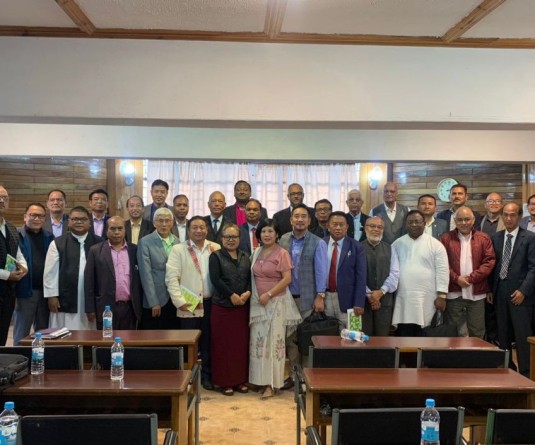
S Ghose
PWD/Landmark Colony, Dimapur
The dilemma of twenty first century is that inspite of having innumerable educational institutions in the forms of schools, colleges and universities; the real purpose of education has not kept pace with the technological changes. The reason for this malaise are not far to seek. Though education in India has grown manifold since independence, still we follow to a great extent the system of education based upon the absolute and effete ideas of Macaulay who opined that Indians should be so educated so as to enable them to become mere clerks - though white-collared, in government offices - in thought, outlook and in mind, they should be English. It is frightening to note that our universities are still functioning on old and outdated lines, and thus producing clerks in large numbers.
The need to foster technical education in a country like ours, which is still on the threshold of progress, must be given paramount importance so as to put the country on the pace of progress, rapid development and fast industrialisation. Now the question is whether industrialisation and advanced technology will get rid this country of all the evils and the obstinate ills like increasing unemployment. The leaders of our country have to ponder over the issue of unemployment which is the burning question of the day.
The technical education which seems apparently the best way of providing the youths with weapons with which they could fight against unemployment can’t do it by itself, until and unless new employment opportunities are created by establishing and developing small-scale industries in large numbers where thousands of people can get employment. Unlike most higher education courses that provide degrees with no specific specialisation in a trade, vocational courses train students for a particular trade.
But in our country, a three year degree course has always been more valued and respected than the short term job oriented courses. As a result, there is a mismatch between the skills required for the job and the skills possessed by the candidates, causing a large number of unemployed graduates in the country. More institutes and universities for vocational training and centres of technical education/colleges should come up and vocational subjects should be made a part of the higher education degrees. At the same time, the society should shun its biased views against these courses and realise the need to have professional courses in this technology-dependent era. An unhappy trend, however, is being introduced in the field of technical education. Statistics show that even in the field of engineering, unemployment, under-employment and insecure employment has started growing. This certainly augurs ill for our young engineers. To worsen things, it may be noted, an engineer or a mechanic cannot fit in any other profession in which he has not specialised. Adjustment in such cases becomes more difficult. So a stricter screening is necessary while admitting students in the technical and vocational institutions. Admission should always be related to likely requirements and final absorption in the society.
Vocational and technical educations prepare us for earning our living. Nowadays, however, finding the vocation is quite a knotty problem. The openings are so many, but opportunities are so few. Almost every profession is over-crowded. Moreover, the study of law, medicine, engineering, architecture, hotel management, tourism and so on are very expensive-beyond the reach of weaker section of people. So the purse of the parents is an important factor in picking up a career. In modern social setting the choice of profession is very difficult. Every young boy and girl is faced with such a problem. A wrong choice may lead a youngster wretchedness and misery.




